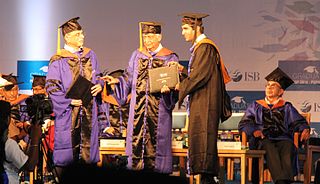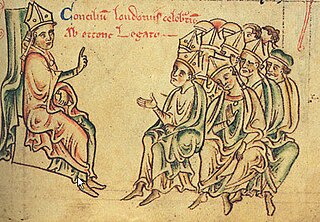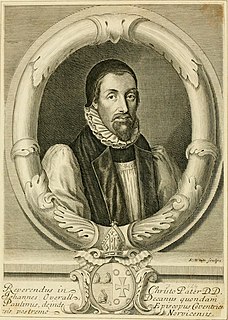Related Research Articles

Anglicanism is a Western Christian tradition that has developed from the practices, liturgy, and identity of the Church of England following the English Reformation, in the context of the Protestant Reformation in Europe. It is one of the largest branches of Christianity, with around 110 million adherents worldwide as of 2001.

The archbishop of Canterbury is the senior bishop and principal leader of the Church of England, the symbolic head of the worldwide Anglican Communion and the diocesan bishop of the Diocese of Canterbury. The current archbishop is Justin Welby, who was enthroned at Canterbury Cathedral on 21 March 2013. Welby is the 105th in a line which goes back more than 1400 years to Augustine of Canterbury, the "Apostle to the English", sent from Rome in the year 597. Welby succeeded Rowan Williams.
Canon law is a set of ordinances and regulations made by ecclesiastical authority, for the government of a Christian organization or church and its members. It is the internal ecclesiastical law, or operational policy, governing the Catholic Church, the Eastern Orthodox and Oriental Orthodox churches, and the individual national churches within the Anglican Communion. The way that such church law is legislated, interpreted and at times adjudicated varies widely among these four bodies of churches. In all three traditions, a canon was originally a rule adopted by a church council; these canons formed the foundation of canon law.
A parish is a territorial entity in many Christian denominations, constituting a division within a diocese. A parish is under the pastoral care and clerical jurisdiction of a priest, often termed a parish priest, who might be assisted by one or more curates, and who operates from a parish church. Historically, a parish often covered the same geographical area as a manor. Its association with the parish church remains paramount.

In many Christian denominations, an archbishop is a bishop of higher rank or office. In some cases, such as the Lutheran Church of Sweden and the Church of England, the title is borne by the leader of the denomination. In others, such as the Roman Catholic Church, there are many archbishops who either have jurisdiction over an ecclesiastical province in addition to their own archdiocese, or are otherwise granted a titular archbishopric.
An ecclesiastical court, also called court Christian or court spiritual, is any of certain courts having jurisdiction mainly in spiritual or religious matters. In the Middle Ages these courts had much wider powers in many areas of Europe than before the development of nation states. They were experts in interpreting canon law, a basis of which was the Corpus Juris Civilis of Justinian which is considered the source of the civil law legal tradition.

William Stubbs was an English historian and Anglican bishop. He was Regius Professor of Modern History at the University of Oxford between 1866 and 1884. He was Bishop of Chester from 1884 to 1889 and Bishop of Oxford from 1889 to 1901.

In Christian churches with episcopal polity, the rank of metropolitan bishop, or simply metropolitan, pertains to the diocesan bishop or archbishop of a metropolis.

A convocation is a group of people formally assembled for a special purpose, mostly ecclesiastical or academic.
The General Synod is the tricameral deliberative and legislative organ of the Church of England. The synod was instituted in 1970, replacing the Church Assembly, and is the culmination of a process of rediscovering self-government for the Church of England that had started in the 1850s.

Synods of Westminster were certain of the more important ecclesiastical councils held within the present bounds of London. Though the precise locality is occasionally uncertain, the majority of the medieval synods assembled in the chapter-house of old St Paul's, or the former chapel of St Catherine within the precincts of Westminster Abbey or at Lambeth. The councils were of various types, each with a constitutional history of its own. Before the reign of Edward I, when convocation assumed substantially its present form, there were convened in London various diocesan, provincial, national and legatine synods; during the past six centuries, however, the chief ecclesiastical assemblies held there have been convocations of the province of Canterbury.

Percival Dearmer (1867–1936), known as Percy Dearmer, was an English priest and liturgist best known as the author of The Parson's Handbook, a liturgical manual for Anglican clergy, and as editor of The English Hymnal. A lifelong socialist, he was an early advocate of the public ministry of women and concerned with social justice. Dearmer, with Ralph Vaughan Williams and Martin Shaw, is credited with the revival and spread of traditional and medieval English musical forms. His ideas on patterns of worship have been linked to the Arts and Crafts Movement, while Dearmer and Vaughan Williams' English Hymnal reflects the influence both of artistic and folkloric scholarship and Christian Socialism. Dearmer ended his life as Canon of Westminster Abbey, from where he ran a canteen for the unemployed.

John Overall (1559–1619) was the 38th bishop of the see of Norwich from 1618 until his death one year later. He had previously served as Bishop of Coventry and Lichfield, as Dean of St Paul's Cathedral from 1601, as Master of Catharine Hall from 1598, and as Regius Professor of Divinity at Cambridge University from 1596. He also served on the Court of High Commission and as a Translator of the King James Version of the Bible.
A deanery is an ecclesiastical entity in the Roman Catholic Church, the Eastern Orthodox Church, the Anglican Communion, the Evangelical Church in Germany, and the Church of Norway. A deanery is either the jurisdiction or residence of a dean.
The "Ornaments Rubric" is found just before the beginning of Morning Prayer in the Book of Common Prayer of the Church of England. It runs as follows:
"THE Morning and Evening Prayer shall be used in the accustomed Place of the Church, Chapel, or Chancel; except it shall be otherwise determined by the Ordinary of the Place. And the Chancels shalt remain as they have done in times past.
"And here is to be noted, that such Ornaments of the Church, and of the Ministers thereof, at all Times of their Ministration, shall be retained, and be in use, as were in this Church of England, by the Authority of Parliament, in the Second Year of the Reign of King Edward the Sixth."

The Anglican ministry is both the leadership and agency of Christian service in the Anglican Communion. "Ministry" commonly refers to the office of ordained clergy: the threefold order of bishops, priests and deacons. More accurately, Anglican ministry includes many laypeople who devote themselves to the ministry of the church, either individually or in lower/assisting offices such as lector, acolyte, sub-deacon, Eucharistic minister, cantor, musicians, parish secretary or assistant, warden, vestry member, etc. Ultimately, all baptized members of the church are considered to partake in the ministry of the Body of Christ.
Anglican doctrine is the body of Christian teachings used to guide the religious and moral practices of Anglicans.
William Bright (1824–1901) was an English ecclesiastical historian and Anglican priest.
The Convocations of Canterbury and York are the synodical assemblies of the bishops and clergy of each of the two provinces which comprise the Church of England. Their origins go back to the ecclesiastical reorganisation carried out under Archbishop Theodore of Canterbury (668–90) and the establishment of a separate northern province in 733. Until 1225 the synods were composed entirely of bishops, but during the thirteenth century more and more clergy were cited until by 1283 the membership was established as the bishops, deans, archdeacons and abbots of each province together with one proctor (representative) from each cathedral chapter and two proctors elected by the clergy of each diocese. The main purpose of the convocations was to take counsel for the well-being of the church and to approve canonical legislation, but in practice much time was spent in discussing the amount of tax to be paid to the Crown since the clergy were a separate estate of the realm and refused to be taxed in or through Parliament. Before the end of the nineteenth century, the Convocation of Canterbury, which was numerically very much larger, played the major role and the activity of the Convocation of York was often little more than giving formal approval to the decisions taken by the southern province.

Laudianism was an early seventeenth-century reform movement within the Church of England, promulgated by Archbishop William Laud and his supporters. It rejected the predestination upheld by the previously dominant Calvinism in favour of free will, and hence the possibility of salvation for all men. It is probably best known for its impact on the Anglican High Church movement and its emphasis on liturgical ceremony and clerical hierarchy. Laudianism was the culmination of the move towards Arminianism in the Church of England, but was neither purely theological in nature, nor restricted to the English church.
References
- ↑ Cross, F. L., ed. (1957) The Oxford Dictionary of the Christian Church. London: Oxford University Press; pp. 230-31